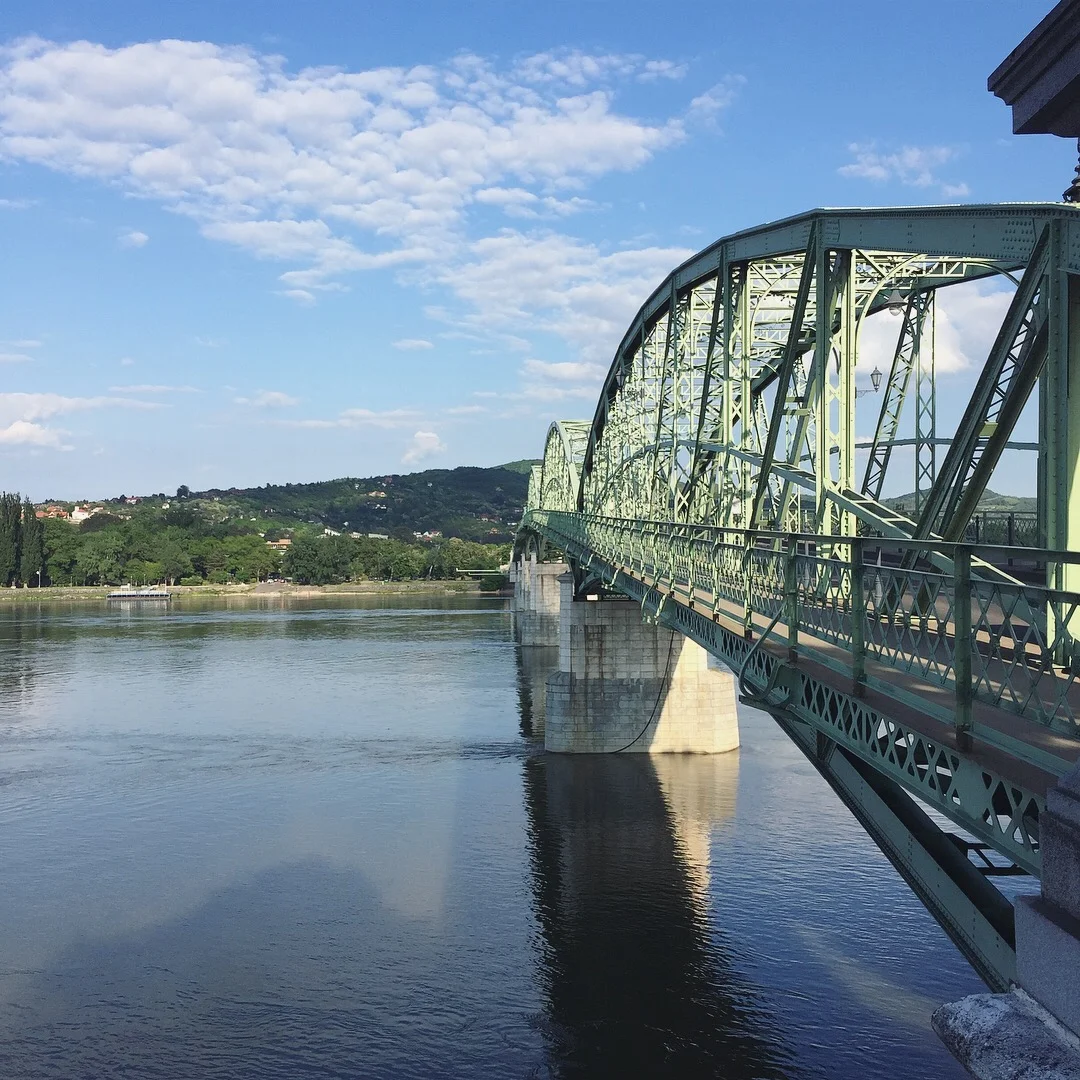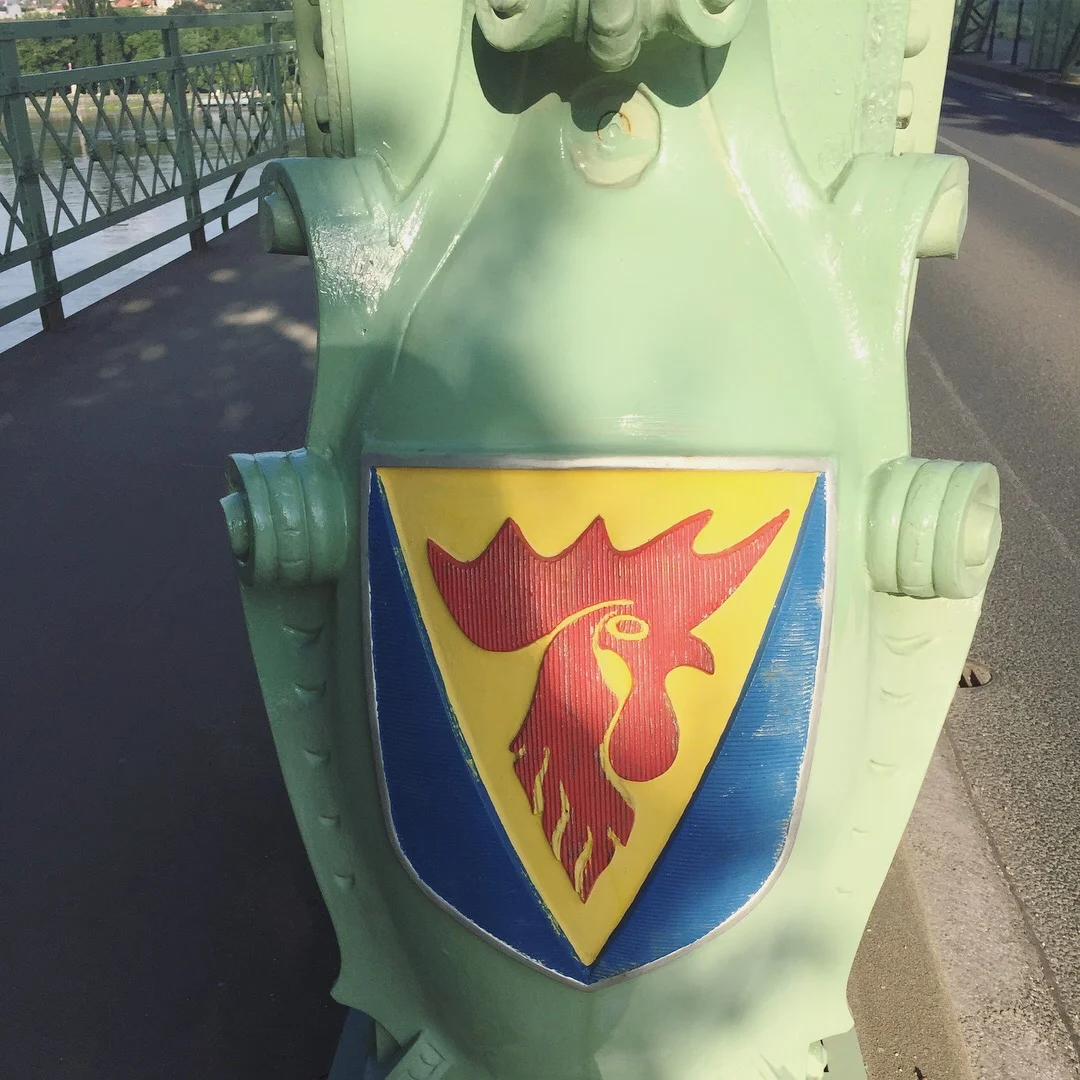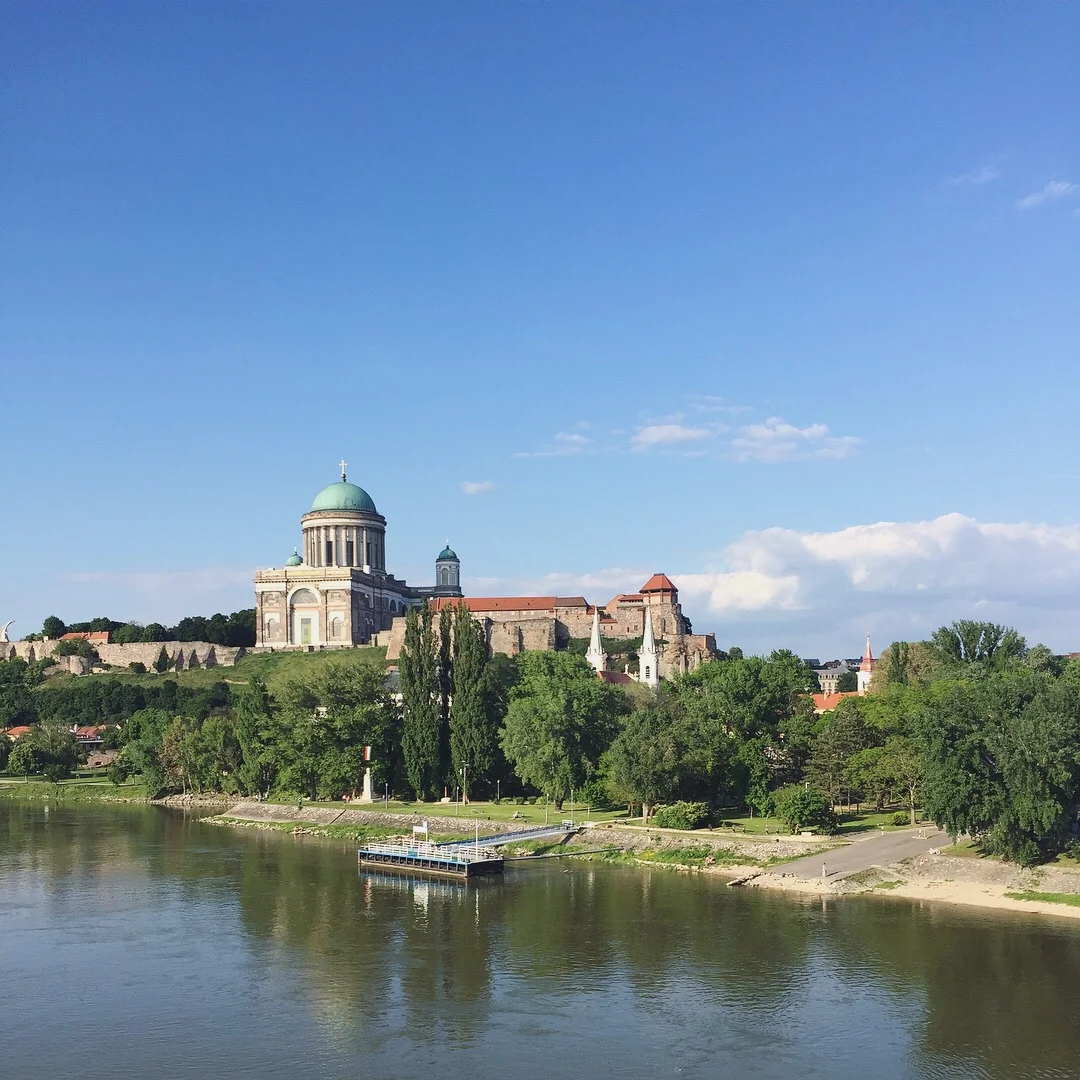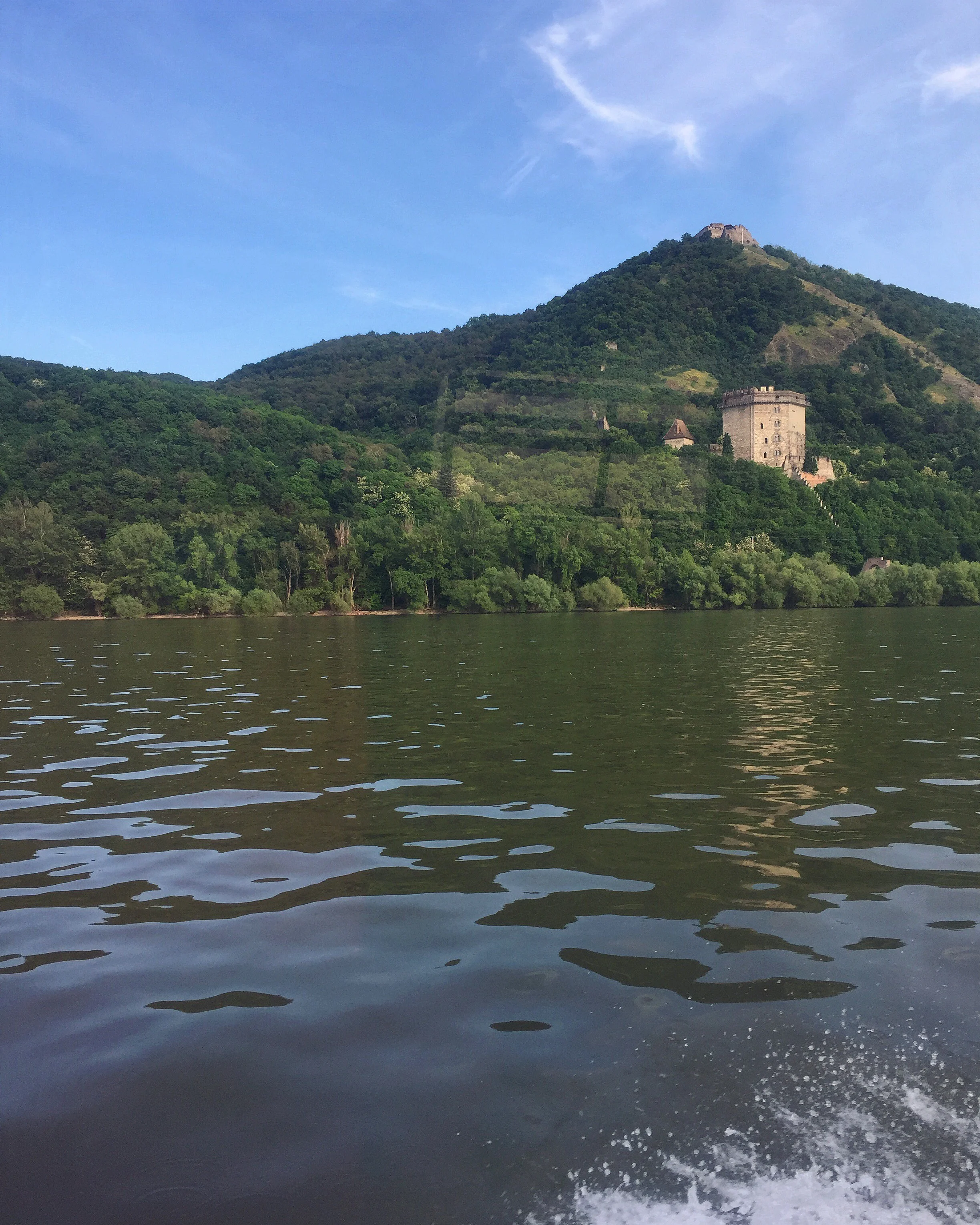Day 16: Tuesday 16th May 2017
Bratislava – Nové Zámky
Irena was an immaculately dressed woman in her sixties, introduced to me by my uncle Edward. They’d worked together in Brussels as MEPs. We met at noon and she took us on a whistle-stop tour of Bratislava’s Old Town, pointing out the site of the old synagogue and the door of Academia Istropolitana, Slovakia’s oldest university. Over lunch in the castle’s restaurant (more duck), she gave us a brief history of the city and its once thriving Jewish Quarter, now completely destroyed. Once again it struck me that whilst Paddy had spent his travels reimagining the Roman, Ottoman and Austro-Hungarian Empires, I’d spent mine reconstructing pre-World War Two Europe.
Irena came from a family of cancer specialists. A former Health Minister, she’d had a career of cancer campaigning; she’d had breast cancer herself and her daughters worked in the oncology department of Bratislava’s main hospital. My cause was close to her heart.
After lunch, we dropped Janine at the station so she could return to Vienna and Irena drove me to Nové Zámky, where I was due to have dinner with the mayor and his secretary. I was so tired I felt queasy and had to pinch my hands to focus on what Irena was saying. Mercifully, the mayor was otherwise engaged (he sings at La Scala in his spare time) so I ended up having dinner with Irena and the mayor's secretary, a lovely thirty-something-year-old woman called Georgina. Irena offered to drive me to Esztergom, worrying I was going to encounter bandits on the road. Georgina laughed and scolded her for perpetuating old wives’ tales. Before she left, Irena gave me a map from her car as I’d struggled to source one for the final stretch of my route. I was constantly amazed by the warmth and generosity of these people who, for a night, would treat me like a daughter or sister.
I turned in early, in the wonderful knowledge that my clothes would be freshly laundered by the morning, in time for my interview with local journalists arranged by Irena to raise awareness of bowel cancer. This picture of me looking like a Girl Guide was taken in Nové Zámky’s main square.
Day 17: Wednesday 17th May 2017
Nové Zámky, Slovakia – Esztergom, Hungary
Another day, another media appearance. Meghan Markle I ain’t, but it felt good to do small things for the bowel cancer cause nonetheless.
After interviews in the hotel garden, Georgina dropped me outside the village of Gbelce for the final few miles of my walk. We exchanged fond farewells and she promised to send me a bottle of slivovitz.
It was a hot day and the road, running directly south to Štúrovo, was dusty and narrow. I’d expected the last few miles to be easy but this stretch – mostly unshaded – provided no rest stops or respite from the sun. Cars and lorries thundered past at an alarming speed and there was no real verge to speak of, just a ditch filled with nettles into which I jumped a number of times. It was the first time I’d felt anxious for my safety. At one point a man stopped ahead of me and waited for me to pass. He asked if I’d like a lift, but my gut told me something was off. I hurried over a bridge and hid in some bushes behind the railway track until I was sure he had disappeared.
I limped into Štúrovo, ankles smarting, back slick with sweat. For some miles I’d been walking towards the magisterial basilica at Esztergom, its verdigris dome towering over the horizon. I was to cross over to Hungary via the Mária Valéria bridge, the point at which A Time of Gifts ends. The elegant green bridge was named after the favourite daughter of Empress Elisabeth (the famous Sissi). The original had been blown up during World War Two, so this was a replica of the one Paddy crossed in 1934. There was something immensely satisfying about lingering there in the late afternoon sun, in no-man’s land between the heraldic cockerel of Štúrovo at one end and the Holy Crown of Hungary at the other.
After showering at my hostel and eating a restorative plate of goulash, I walked up to the basilica. Horse chestnut lanterns and creamy hawthorn bushes shone dimly in the gloaming; the air was heady with their perfume. Black-robed seminaries were leaving evening prayers. I nodded to a pair in greeting, but they swiftly disappeared down a side street into the night.
*See previous entry*
The beautiful Mária Valéria bridge, which spans the Danube and joins Slovakia and Hungary, with the emblem of Štúrovo at one end and the stunning Basilica in Esztergom at the other.
In the closing pages of A Time or Gifts, Paddy writes of this crossing point: ‘I found it impossible to tear myself from my station and plunge into Hungary.... because this future seemed, and still seems, so full of promised marvels. The river below, meanwhile, was carrying the immediate past downstream and I was hung poised mid-air between the two.’
Day 18: Thursday 18th May 2017
Esztergom – Budapest, Hungary
I caught up with my diary over breakfast in the local bakery, sitting next to towering stacks of freshly-baked bread. Munching on a kakaós csiga (chocolate snail) – a buttery, chocolate-studded roll loved by the Hungarians – I watched locals trailing in and out, exchanging loaves and pleasantries with the women behind the counter in an impenetrable language. Lotti had told me that Magyar’s closest relative was Finnish. I could just about make out szia for hello and koszonom for thank you.
Esztergom is known as the Rome of Hungary and the Basilica - its beating heart - is a great Italianate beauty perched above the small city, topped with verdigris domes which I could see for miles as I trudged through the flat Slovakian fields the day before. I decided to climb it and, 400 very crumbly steps and a few heart palpitations later, I made it to the top of the cupola.
That afternoon, I caught the hydrofoil to Budapest. Sandy coves and wooded hills edged the river, with equally sandy-coloured fortresses looking out over the water (pictured). The afternoon sun lit up white houses with terracotta roofs amid the trees. You could have been in Italy or Southern France. Cool air rushed through the cabin and there was no sound other than the hum of the engine and the hiss of the spray. At Vác, an old jetty listed alarmingly into the water, its ticket cabin almost completely submerged, a reminder that this stately river must have other sides.
The closer we got to Budapest, the more Soviet-style blocks rose out of the trees. Ochre and russet buildings clashed with peach, the hard lines and brutal architecture jarring against Romanticism of the earlier part of the journey. The boat slowed as we passed the gothic Hungarian Parliament Building and very soon we reached the drop-off at Vigadó Square.
Lou and Matt – who had been introduced to me by an old colleague – were waiting for me at the jetty with a hand-drawn sign, although I was easy enough to spot as the only person under 70. At dinner they introduced me to palinka (to be sipped rather than thrown back like schnapps or slivovitz). A glass of Tokay before bed and I was out like a light.
Day 19: Friday 19th May 2017
Budapest, Hungary
Matt and Lou lived on ‘Antique Street’, where all the buildings seemed to have art deco mouldings. Their balcony overlooked a canopy of trees (pictured). Matt showed me around town, with an obligatory visit to the Baths and a too-brief look around the covered food market and some antiquarian bookshops.
That evening Tara – a connection via Slightly Foxed, who was to become a friend – picked me up from my new lodgings at Brody Apartments and together we wandered over to Muzeum Kurok, where a party was being held in my honour by some PLF aficionados. We were greeted by Irish writer Michael O’Sullivan, dapper in raspberry trousers and a blue blazer with a pocket handkerchief. He kissed my hand in welcome, making lots of noise about my being the heroine of the evening. Another woman I met on my way in grasped my hand and almost curtsied in greeting. I thought of Paddy's words about Hungarian greetings and realised not much had changed in some circles.
The apartment was an Aladdin's Cave, crammed with exquisite art, including a portrait of Paddy himself. I was introduced to a flurry of people including Gloria, daughter of Tibor and Berta, the sophisticated Budapest couple who took Paddy under their wing in spring 1934. Paddy had borrowed Tibor’s horse to cross the Great Hungarian Plain. But he got one thing wrong when he wrote it all up, Gloria told me: the dog. “We never owned an Alsatian,” she said, putting her fingers up like pricked ears, trying to remember the breed. “Doberman!” she exclaimed. She confided that, on his death bed, her father's last words had been along the lines of “Oh, what would life have been without the love of dogs?” We agreed this was very true.
“Gloria is a great favourite of Prince Charles,” Michael later told me. I could see why. She exuded great warmth and charm, her dark eyes merry and cheeks dimpled. Whilst we were talking, a man with twinkling eyes joined our little party on the sofa, introducing himself as Andras. “Ah! So you must be the one we are honouring tonight,” he said wryly, pointing at my scuffed plimsolls. Gloria rushed to my rescue; Paddy had worn gym shoes with his suits.
Day 20: Saturday 20th May 2017
Budapest, Hungary – London, England
I woke up in my lovely bedroom in Brody Apartments with the mother of all hangovers. No amount of starched cotton sheets, coffee or eggs could undo the excesses of the night before.
It had been around 2am when we’d decided we should probably call it a night after a wonderful but very boozy evening chatting politics, religion, love, death, life, Harriet and Paddy. It was only me, Andras (the plimsoll commentator), Tara and Michael left in the room. Along with Gloria, cigar-puffing 68-year-old Andras was another favourite from the evening and was to become something of a pen pal (I currently have a book from him sitting on my bedside table). He kept on exhorting me to stay and come to a dinner the following evening - “I'll pay for a first-class ticket!” - but London and work called.
I had a couple of hours to spare before my airport car arrived, so I headed down to the river and across the Chain Bridge. Despite my sore head, I felt a soaring sense of liberation as I looked out over the Danube at the Hungarian Parliament building (pictured below). The city shimmered pearl-like in the midday heat, and the words of the framed Edgar Allan Poe poem (below) hanging on my bedroom wall at Brody Apartments seemed a fitting caption for the dream-like state I found myself in after three weeks of wandering.
And then it was over. That night, back in my own bed in London, I dreamt of a mustering of storks flying from a rooftop with their huge wing spans close enough to touch.
Take this kiss upon the brow!
And, in parting from you now,
Thus much let me avow —
You are not wrong, who deem
That my days have been a dream…
A Dream Within a Dream by Edgar Allan Poe







